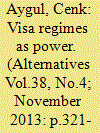| Srl | Item |
| 1 |
ID:
134770


|
|
|
|
|
| Summary/Abstract |
This article evaluates foreign policy change under the Justice and Development Party (JDP). After examining the concept of change in foreign policy analysis and in the literature on Turkish foreign policy, the article offers an approach to visa regimes as significant indicators of change in foreign policy. It first provides a qualitative analysis of Turkish visa policies in comparison to those of the European Union (EU) and shows that, after a brief period of convergence, Turkish visa policies have increasingly diverged from the EU. Subsequently, by way of analyzing the incoming mobility of foreign nationals, first the JDP era is compared to its predecessors. Then, two distinct eras within JDP's period of rule are identified and compared. It concludes that, while there are differences between the JDP and the previous eras, the most significant change occurs between the first and second JDP governments.
|
|
|
|
|
|
|
|
|
|
|
|
|
|
|
|
| 2 |
ID:
129486


|
|
|
|
|
| Publication |
2013.
|
| Summary/Abstract |
This article examines the significance of labor mobility for capitalism and analyzes the visa regimes of the European Union (EU) and Turkey. After the fall of the Berlin Wall, labor mobility originating from Eastern Europe has been redirected to the West, taking the form of circular migrations and replacing the previous rotation system. While the new forms of circular mobility created insecure employment conditions for many people, it also required a visa regime to classify people when they arrive at the borders. Both nation-states and supranational organizations such as the EU continue to build regulatory capacities. The second half of the article examines the Schengen agreement and the ways in which French German sensitivities were "communitized." While other East European countries chose to be a part of the Schengen agreement's restrictive visa policies, this option was not possible for Turkey, which established a fully liberal regime.
|
|
|
|
|
|
|
|
|
|
|
|
|
|
|
|